FORCLIME
Forests and Climate Change ProgrammeTechnical Cooperation (TC Module)

Select your language
Background
Forest inventories serve the purpose of collecting forest data and other relevant information for management (here: forest management units - FMUs). They provide the basis for all further analyses and planning steps as defined in long-term as well as annual business and management plans.
The application of sound and efficient forest inventory methods at FMU level is a precondition for the formulation of 10-year as well as annual management plans of FMUs and therefore of central importance to the forest sector reform of the Indonesian Government. Specific inventories need to be conducted at regular intervals at FMU, resort (RPH) and compartment level to provide the basis for forest management by determining the potential of forest and non-timber forest products.
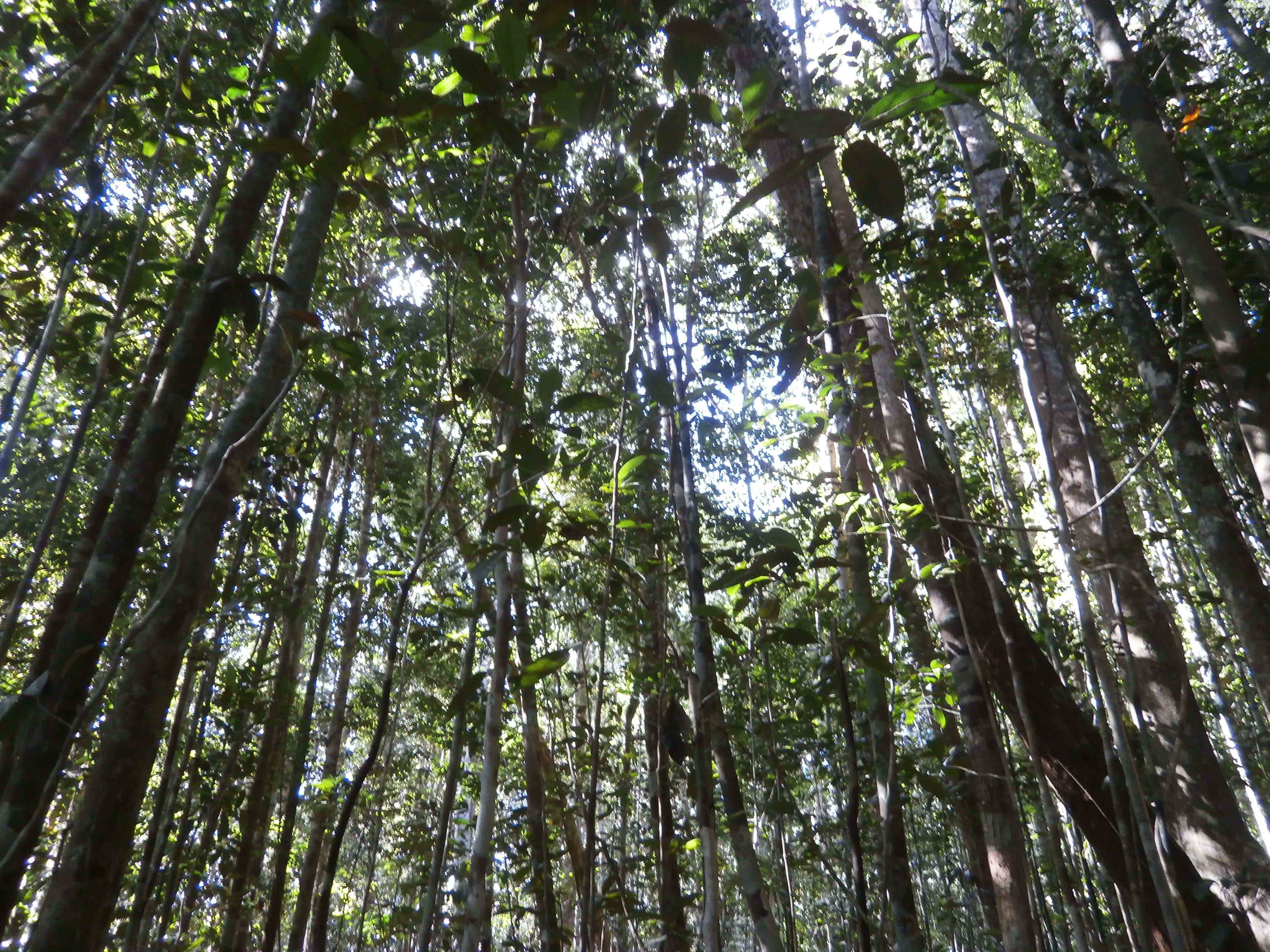
Challenges for forest inventories at FMU level:
The previously developed inventory guideline (released in 2012) as well as the general conditions for forest inventories caused various challenges and difficulties to the implementation at FMU level:
Methodology:
Capacities of stakeholders:
Mandates of stakeholders:
Scale and topography:
Land tenure and utilization rights:
FORCLIME supported the revision of the FMU forest management inventory guideline
FORCLIME has supported MoEF’s Directorate for Forest Resources Inventory and Monitoring (IPSDH) in the review and revision process of the technical guideline for FMU forest management inventories since 2015. In close collaboration with IPSDH and together with the ForestEye consultant team from the University of Goettingen, Germany, several Focus Group Discussions (FGD), workshops and trainings have been conducted which finally led to a revised technical guideline and a minimum standard:
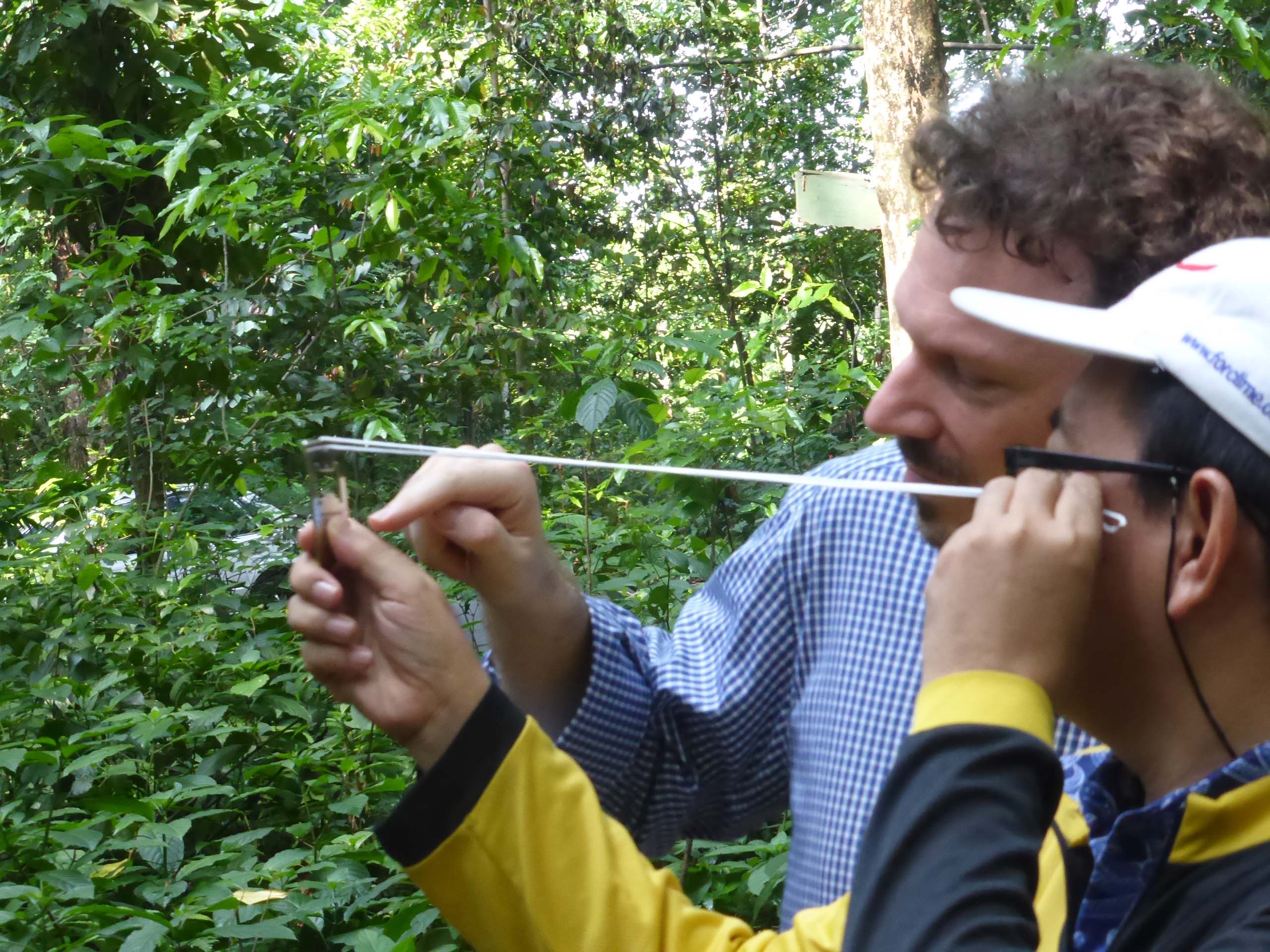
For further information please contact:
Tobias Goedde, Strategic Area Manager for Sustainable Forest Management (SFM)
Background
Forest fires across Sumatra and Kalimantan are blanketing the region with haze and pose a significant threat to human health. Additionally forest fires contribute significantly to biodiversity loss from deforestation and land use change. Especially peat-land fires heavily impact the health of people in these provinces and neighbouring countries and account for the largest source of greenhouse gas emissions in Indonesia.
Indonesia is one of many countries that are fighting against frequent forest and land fires in a fire-prone environment. In South Africa, wildfire is a natural phenomenon that occurs annually during two dry seasons.
South Africa developed a highly professional Integrated Fire Management (IFM) system, centred on the Working on Fire (WoF) Programme. WoF is a government-funded programme, through the Expanded Public Works Programme (EPWP) for the recruitment and training of young men and women from local communities. The community members are employed and trained to form wildland firefighting ground crews that conduct IFM.
Even though the ecosystems in South Africa and Indonesia differ greatly, certain aspects of the WoF Programme may be transferable to the Indonesian context and learning from the highly advanced South African integrated wildfire management system may support the development of promising fire management initiatives and successful fire management in Indonesia.
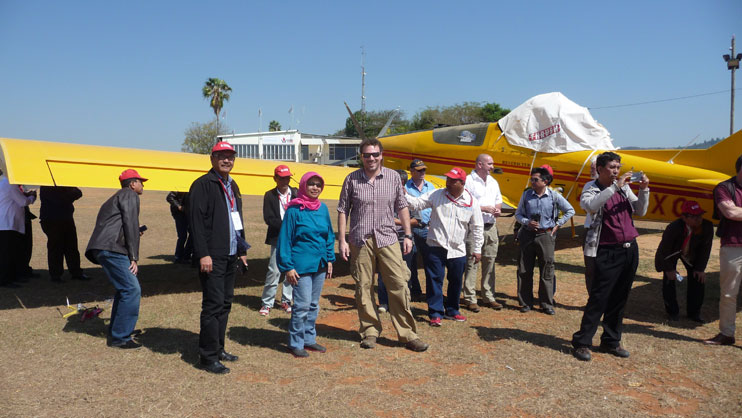
Summary
During the week of August 21 – 28, 2016, delegates from the Indonesian Government, representatives from GIZ FORCLIME, UNOPS/GAMBUT, Working on Fire and Kishugu attended a South-South technical exchange on wildfire preparedness, prevention and response. The technical exchange was made possible by GIZ FORCLIME and UNOPS/GAMBUT. Indonesian delegates attended lectures and visited WoF operations, Fire Protection Associations (FPAs), FireWise communities, Firehawk installations and the Kishugu training center in Pietermaritzburg, Nelspruit and the Kruger Park areas.
The aim of this exchange was to provide Indonesian stakeholders, at national and provincial level, with first-hand information and experience on the Integrated Fire Management system as it is implmeented in South Africa. There were possible synergies investigated during the exchange on Public Private Partnerships, legislation, financing IFM and tentative FPA development on FMU level in the Indonesian context.
Objective
The objective of this technical exchange is to provide Indonesian stakeholders at the national and provincial level with first-hand information and experience on the South African WoF programme, and to foster a discussion on the applicability/ transferability of certain aspects of the WoF model to the Indonesian context. At best, this leads to the establishment of a close technical assistance partnership between WoF and its Indonesian counterparts – a partnership that contributes significantly to improvements in Indonesia’s wildfire management system.
Study trip experiences based on the WoF model
First, the WoF programme provides valuable inputs and recommendations for the reformation of Indonesia’s recruitment and training of forest fire fighters. As indicated above, in order to reach an adequate manpower of forest fire fighting ground crews in Sumatra and Kalimantan, thousands of people have to be recruited and trained in the upcoming years. For that, participants keenly observed that the WoF programme was initiated as a job creation and social uplifting programme which was then contracted out to a private company (KISHUGU) for implementation and management. Additionally participants supported the importance of research on fire management and responses expected from the affected environment.
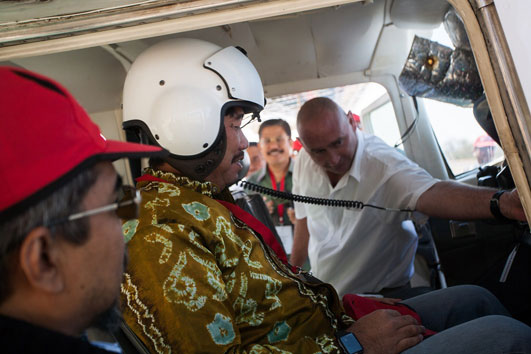
Second, the WoF programme shows that fire management can be combined with social development efforts – not just among the fire fighters themselves but also within the communities from which they are recruited. On the one hand, Indonesia’s forest fire fighters could become advocates for fire risk awareness among their communities. During out of fire seasons they could implement fire prevention and mitigation strategies and help local communities in better understanding the risk of fire, provide basic skills in fire response and make them aware of the potential benefits of sustainable custodianship of their environment. The participants really commenced on the improvement of communication in-between fire management stakeholders, be it the private sector or governmental institutions.
Third, the WoF funding mechanism may be transferable to the Indonesian context. WoF is funded both by government and by contributions from private land-owners (forestry concessions, farms and ranches) through so-called Fire Protection Associations (FPA). While membership in these associations is compulsory for public land owners and voluntary for private landowners, the latter are widely encouraged to participate in the FPAs through legal incentives, making them a major source of funding for the Integrated Fire Management (IFM) system. More precisely, South African land owners face stringent duties for wildfire prevention and response. As such, they can also be held accountable for the damages caused by a wildfire that started or spread from their land, unless the respective person can prove that he or she was not negligent (presumption of negligence). This is where participants were introduced to the law enforcement aspects and the underlying legislation of IFM. However, the presumption of negligence does not apply for FPA members. The FPA model is particularly relevant in combination with the Forest Management Unit (FMU) development currently being implemented in Indonesia. Follow-up meetings are planned with the Indonesian Association of forest concessionaires (APHI).
Fourth, currently Indonesia’s fire management mainly focusses on fire suppression. However suppression is only one out of many components of IFM. The WoF community awareness model may be transferable to the Indonesian context. Additional to the use of local youth in firefighting efforts, WoF has developed the FireWise Communities programme for implementation in rural and developing communities dependent on the landscape for their livelihoods. This awareness and education model could underpin a nationally coordinated community-driven awareness programme to reach out and involve all levels of Indonesian society in eliminating the majority of fires before they start. This is especially relevant in Indonesia where various agencies and companies have undertaken a variety of community awareness programmes with widely varying and often conflicting messages to the public. Due to the similarities in socio-economic conditions in communities, the WoF FireWise programme provides effective concepts for the integration of and collaboration with communities in the IFM system.
For more information, please contact:
Tobias Goedde, Strategic Area Manager, Sustainable Forest Management
FORCLIME continues cooperation and capacity development in the field of SFM through forest certification (SVLK/ PHPL/ FSC) in the FMU Berau Barat by collaborating with The Borneo Initiative (TBI) and The Nature Conservancy (TNC). From 28 September until 07 October 2016, a team from the organisations above conducted site visits in the three forest concessions supported by FORCLIME, namely PT. Utama Damai Timber (UDIT), PT. Wana Bhakti Utama (WBPU) and FSC certified PT. Gunung Gajah Abadi (GGA). The activity, which is part of FORCLIME’s support under the strategic area ‘SFM Sustainable Forest Management’, took place in the FMU Berau Barat, Berau District, East Kalimantan. Support to concessions to obtain SFM certification from the SVLK/ PHPL mandatory national certification scheme and the Forest Stewardship Council (FSC) has been provided since 2013.
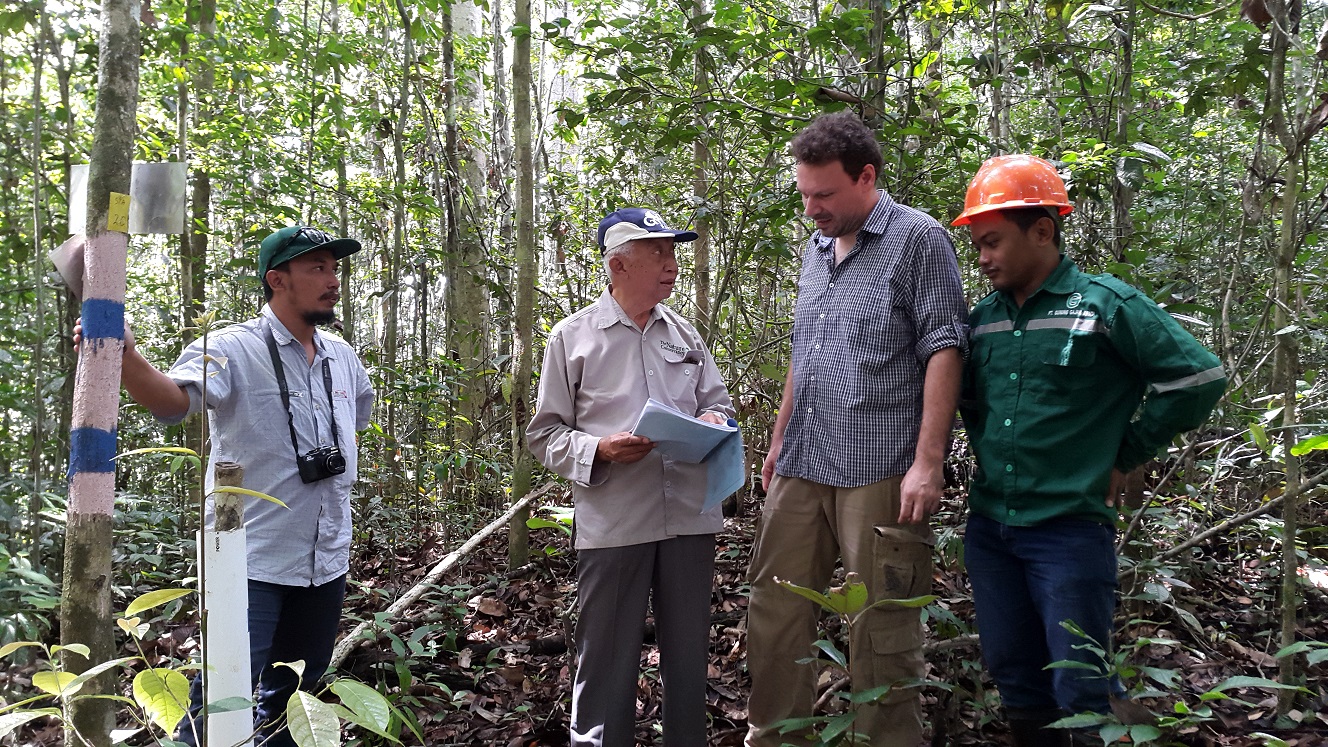
The goal of fostering SFM and FMU development is tackled by intensively working together with so called certification coaches aiming at involving local communities and the private sector. Joint activities include technical trainings, social impact studies and community participation. The certification coaches monitor and supervise the studies, trainings and activities that lead towards one of the above mentioned forest certifications. Depending on the progress made by each forest concession and their experience with SFM, the process of receiving the SFM forest certification varies. Some decisive factors include experience and start-up investment (e.g. forest and basic infrastructure in virgin natural production forests), or duration of operations in the concessions; some companies already operate for more than 30 years whereas others started operations only five years ago.
In terms of forest operations and Reduced Impact Logging to reduce emissions (RIL-C), all three concessions received the full RIL training. This has resulted in at least 25% emission reduction on 136,000 ha, according to the TNC Verified Carbon Standard (VCS) methodology.
The field team observed that river water levels play a crucial role in transporting logs, which ultimately influences the company’s revenue streams. Many concession companies rely on the feasibility of river based rafting practices. Low river water levels result in long storage periods of logs by the river. However this leads to reduced log qualities which may affect log sales prices. Additionally natural events such as irregular rainfall have a major impact on the success of the concession company and hence the sustainability of logging in natural production forests. The optional pure road transport of logs may be an option for some concessions but not for all.
Additionally challenging terrain in mountainous areas and rainfall patterns significantly influence the logging operations as such. Heavy rainfall can stop operations until sunny weather dries the trails and roads for machines and trucks to operate safely.
As far as FSC certified concessions are concerned, managers positively reported on price premiums for FSC certified logs. In certain cases it seems that up to 10% price premiums are paid by buyers based on their clients’ requests.
The visits paid to tree nurseries in the concessions as well as field observations led to the conclusion that there will be a continuous shift of age and diameter classes as well as tree species composition over the future decades in the natural production forests. It became clear that the timber companies reforest and enrich their forest stands with species listed as ‘commercial tree species’ which can be found in the concession’s inventory documentation. Fast growing native species are planted on open spaces left behind from logging operations.
The silvicultural system and logging restrictions are currently based on species, target diameter and logging rotation cycle (30 years). Tree age, forest composition and (annual) increment are generalized over species categories and often poorly documented and/ or analysed as the information is not required to obtain a logging license.
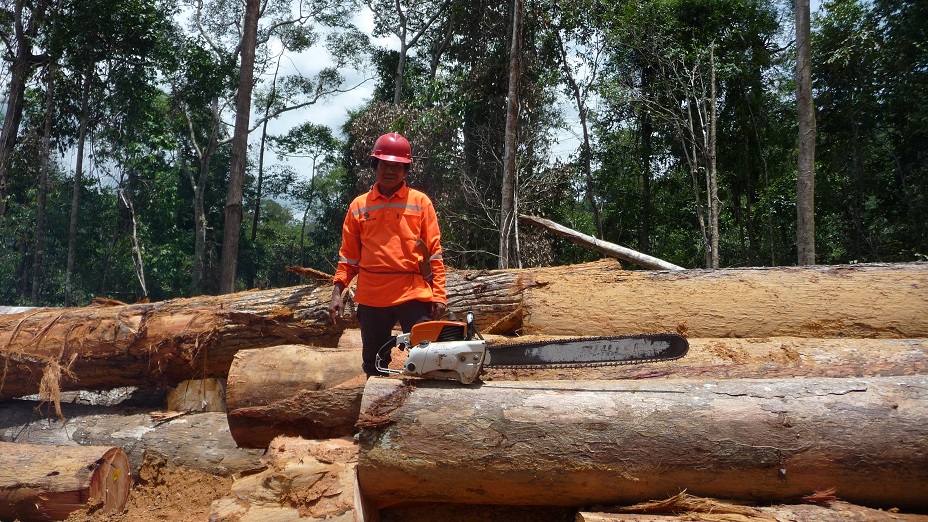
The FMU Berau Barat covers approximately 780,000 hectares. Almost 50% of the area is categorized as limited production forest (Hutan Produksi Terbatas – HPT) and production forest (Hutan Produksi – HP). Within the FMU Berau Barat there are 12 forest concessions (natural forest/plantation forest). Therefore, the implementation of SFM in the concessions is an essential indicator and crucial for climate change mitigation actions.
For further information, please contact:
Tobias Goedde, Strategic Area Manager for Sustainable Forest Management
Suprianto, Technical Advisor for FMU development, Berau office
Responding to the growing calls for gender mainstreaming, the Ministry of Environment and Forestry (MoEF) initiated a process to mainstream gender in the forestry sector, asking the GIZ FORCLIME Programme for technical assistance. Gender mainstreaming in the development context aims to improve the quality of participation in and utilization of development processes for both men, women, and other marginalized groups. In March 2014, the Gender Working Group of the MoEF requested FORCLIME to support the Ministry in several areas:
• to integrate gender mainstreaming into MoEF’s Forestry Strategic Plan (RENSTRA 2015-2019),
• in the development of a “Gender Responsive Forestry and Climate Change Programme”,
• to revise the Ministerial Decree on the “Guideline for Implementation of Gender Mainstreaming”, and
• to implement and facilitate the documentation of lessons learned from gender mainstreaming pilot activities in the FORCLIME demonstration areas in Kalimantan.
How does FORCLIME support gender mainstreaming?
GIZ FORCLIME supported the Gender Working Group at MoEF in the inclusion of gender aspects into the Ministry’s Strategic Plan (RENSTRA 2015-2019) as well as in piloting the field implementation. This included establishment of demonstration activities at sub-national levels and – in a strategic partnership with the GIZ Strengthening Women Rights project (GIZ SWR) – leveraging SWR’s work with the Ministry of Women and Empowerment (MoWE) towards the forestry sector, using a multilevel approach.
What has been achieved so far?
• FORCLIME supported MoEF and MoWE on disseminating gender issues and Community Dialogue methodologies to 50 government officials in in East Sumba District, to 30 officials in Agam District, 30 officials in West Sumatra Province, 25 government officials in Berau District in East Kalimantan Province and 20 officials from Malinau District (North Kalimantan Province).
• FORCLIME supported MoEF and MoWE to conduct trainings on gender mainstreaming with 60 farmers (organized in farmers groups) in Sumba Timur District and with 50 farmers from Agam District. Awareness raising on gender mainstreaming and child protection was also facilitated with 50 farmers from Tepian Buah Village and 30 farmers from Long Okeng Village in Berau District as well as 35 farmers in Setulang Village, Malinau District. Besides GIZ’s conceptual framework on gender mainstreaming, the Community Dialogue approach from GIZ Strengthening Women’s Rights project (GIZ SWR) was used.
• FORCLIME supported the revision of the Ministerial Decree SK Menhut No.528/Menhut-II/Peg/2004 on the “Guideline for the Implementation of Gender Mainstreaming”. FORCLIME, together with MoEF’s Gender Working Group, has trained at least 100 auditors from MoEF on gender, gender mainstreaming, as well as gender responsive planning, budgeting and auditing. The auditors will have the role to audit all units in MoEF on gender-based programmes and activities as outlined in the Ministry’s planning and budgeting. As gender-based auditing will be mainstreamed in 2016, the performance of all units in the Ministry will be measured against their gender-responsiveness. This auditing process will continue in medium to long term as it is mandated in the legislation.
• FORCLIME supported its partners at MoEF, the COP signatories, during the process of formulating a position on “climate change, forestry and gender” to be presented at COP 21 in Paris.
What was our impact?
• Gender mainstreamed in national strategies: Through GIZ FORCLIME’s contribution, the overall five-year national forestry strategic plan (RENSTRA) 2015-2019 was gender-mainstreamed. MoEF allocated a gender responsive budget for 2014 of IDR 30,081,042,000 and budgeting for gender activities over the next five years will be allocated as outlined in the RENSTRA.
To ensure the adherence of these plans FORCLIME, together with the MoEF Working Group on Gender, trained over 100 auditors of the Inspection Directorate on gender mainstreaming on how to audit the planning, budgeting and implementation of activities. The gender based auditing has a legal basis and will be implemented in 2016. All units in MoEF will thus be measured against their success in integrating gender-responsive activities in their planning frameworks.
• Multiplier effect: Through FORCLIME’s gender-related activities 25 gender focal points have been trained via the ToT approach, which extended the gender training towards 155 government officials and 215 farmers on field level. Additionally in a South-South dialogue the lessons learned from gender mainstreaming in MoFE were shared with 50 participants of GIZ Brazil projects on the 22 July 2015.
• Acknowledgements beyond our collaboration: In a national competition among all ministries, the Government of Indonesia awarded the top award to MoEF for implementing gender mainstreaming in its planning documents and activities. As a result of the support and collaboration, in 2016 MoEF is likely to move up to level 1 in the annually awarded national prize for “Gender Mainstreaming Classification” among all ministries. Also, GIZ FORCLIME won the first prize of the “GIZ Communicating Gender Award” in 2015 for GIZ Indonesia, Timor Leste and ASEAN.
Next steps
FORCLIME will continue to support the Gender Working Group at MoEF in the implementation of gender mainstreaming with focused emphasis on sustainability of mainstreaming through policies, as well as monitoring and evaluation involving both auditors and inspectorates.
Please watch the video of the Ministry of Environment and Forestry to learn more about our joint activities.
Responding to the growing calls for gender mainstreaming, the Ministry of Environment and Forestry (MoEF) initiated a process to mainstream gender in the forestry sector, asking the GIZ FORCLIME Programme for technical assistance. Gender mainstreaming in the development context aims to improve the quality of participation in and utilization of development processes for both men, women, and other marginalized groups. In March 2014, the Gender Working Group of the MoEF requested FORCLIME to support the Ministry in several areas:
• to integrate gender mainstreaming into MoEF’s Forestry Strategic Plan (RENSTRA 2015-2019),
• in the development of a “Gender Responsive Forestry and Climate Change Programme”,
• to revise the Ministerial Decree on the “Guideline for Implementation of Gender Mainstreaming”, and
• to implement and facilitate the documentation of lessons learned from gender mainstreaming pilot activities in the FORCLIME demonstration areas in Kalimantan.

FMUs need to fulfill certain requirements to be operational (as stipulated in Provision 6/2007). One requirement is to develop investments that support achieving the objective of sustainable forest management. Hence, FMUs must have an adequate financial management system in place, in addition to already existing budgeting systems under the national and sub-national government framework (APBN or APBD).
FORCLIME has been supporting this process of implementing financial management systems for Forest Management Units in Indonesia for several years already, in particular together the Forest Management Unit Gularaya in Southeast Sulawesi Province. With the help of FORCLIME’s facilitation and guidance, several milestones could be achieved.
The first milestone: In early 2012, FORCLIME funded a study entitled Policy concept of investment and financial management system for Forest Management Units (FMU). The study was conducted by a team of consultants with diverse expertise in forestry as well as in public administration and finance, and was completed in August 2012. (The consultant team consisted of: Bramasto Nugroho; Sudarsono Soedomo; Handra Hefrizal; Agus Setyarso; Guido Kartodihardjo; Ali Djajono)
The second milestone: FORCLIME also supported the publication of the book “PPK-BLUD – Towards Independent FMUs” (1st edition, September 2013).
The third milestone: FORCLIME initiated a trial for the implementation of PPK-BLUD in the Gularaya Production FMU, Southeast Sulawesi Province. The trial started in June 2013.
The fourth milestone: Between March - May 2014, an intensive facilitation process was conducted at Gularaya Production FMU in cooperation with local academicians from the University of Halu Oleo Kendari. The objective of the facilitation process was to prepare the required documents for implementation of PPK-BLUD in FMU Gularaya.
The activities conducted are:
The fifth milestone: A major success was the issuance of the Southeast Sulawesi Governor Decree 636/2014 on the establishment of a PPK-BLUD Assessment Team for FMU Gularaya, dated November 11, 2014.
The sixth milestone: As a result of facilitating the trial for PPK-BLUD implementation at GularayaProduction FMU, several local government regulations were issued:
The seventh milestone, or latest achievement in 2016 supported by FORCLIME, is the provision of the PPK-BLUD Guidance – Towards Independent FMUs (2nd edition). Improvements have been made to the 1st edition, with the new guidance now including necessary templates for the implementation of PPK-BLUD at FMU level. This guidance may assist FMU managers in Indonesia to learn from the approach taken in FMU Gularaya and implement it in their own FMUs.
For further information, please contact:
Gatot Moeryanto, Senior Adviser for FMU Development
Wandojo Siswanto, Strategic Area Manager for Forestry Policy (National and Sub-national Regulatory Framework)


